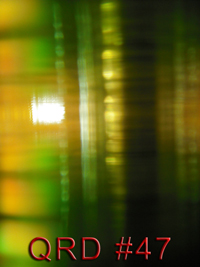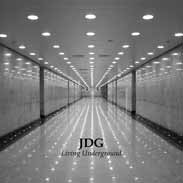









January 2011

Label: Cohort Records
City: Monticello, IN, USA
Artists Roster: ‘kirchenkampf’, The Oratory of Divine Love, >wirewall<, Art Simon, Knurl, Pholde, gorehallreider, omnid, J. Kannenberg, shifts, Vertonen, Bumsteinas, Jasenka, Josh Dippold, Toktela, Tagihashi+Sato+Higo, pbk, Adam Mokan, Embrace the Glass, Haslam, Fred Lonberg-Holm, Brekekekekexkoaxkoax, Michael Gendreau, dronaement, The Infant Cycle, JDG, Jeph Jerman, amk, Caress of My Fist, N.Strahl.N, Metek, Tom Dimuzio, Condure
Websites: cohortrecords.0catch.com, www.myspace.com/kirchenkampf
QRD – When & why did you start your label?
John – I started the label in the early 1990s to release my own music plus those I liked.
QRD – Where did you get the money to finance your first few releases?
John – I used my personal spending money & credit cards.
QRD – How many releases have you put out?
John – So far I’ve released 37 CDRs & 3 vinyl. I released 4 cassettes of my music before the start of my label.
QRD – How many releases would you like to do a year?
John – As many as I can afford.
QRD – How many hours a week do you work on the label & how many would you like to?
John – I put in about 5 hours a week on the label on average.
QRD – What are the fun &/or rewarding parts about running a label?
John – I just get a kick out of putting music out there that doesn’t fit anywhere else. There’s definitely the simple satisfaction of making something, which is why most of my releases come in handmade covers etc.
QRD – How have your motivations for having a label changed?
John – They haven’t changed all that much.
QRD – What makes you label special & unique?
John – As I mentioned above, I usually incorporate some sort of handmade aspect to the release. I like the idea that the release isn’t exactly the same for each one.
QRD – How has your physical location effected your label?
John – This really doesn’t make a difference anymore as far as the label is concerned. What is more isolating is the fact that there aren’t any large scenes for this kind of music close by. You have to drive at least an hour before you get to a major city. I would like to be able to go to shows & sell my releases there where the interest is.
QRD – Do you enjoy music as much now as you used to & how has running a label effected how you listen to/hear music?
John – Yeah, I still listen to a lot of music & not just the kind of music I release & play, but all kinds.
QRD – What’s your demos policy?
John – Send what you like, but expect to be turned down. I will contact you if I like it.
QRD – How do you find out about new artists for your label?
John – MySpace, other labels rosters, contacts from artists.
QRD – How do most fans find out about your label?
John – I expect word of mouth & the internet.
QRD – What’s been your biggest selling release & why do you think it was?
John – I don’t have big selling releases. I’ve only sold out of two so far, a 10” LP by Troum about 10 years ago & a 3” CDR by Bad Sector. These are big names & so sold well. Most of the other releases are by relatively unknown artists & artists with small audiences. Everything else is still in print.
QRD – What release that you’ve done was the most important & special to you personally?
John – The Troum 10”.
QRD – What are some things that make you want to work with a band?
John – If I like their music. I don’t release artists motivated by money.
QRD – What is the thing all releases on your label have in common?
John – They don’t fit in the mainstream.
QRD – How involved are you with a band for acting as a producer as far as hearing demo ideas or selecting tracks to be on a release or mixing & mastering?
John – I’m not. They send a demo & if I like it I release it as is.
QRD – How involved do you like to be in the artwork design for a release?
John – I usually do all the artwork since most of the time I’m going to be making it. I design it to be interesting, but relatively easy to reproduce with common materials.
QRD – How long is it from when an artist delivers an album to you until release date & why?
John – Available time & finances usually are a key ingredient to a release date.
QRD – If you really like a band, but aren’t sure you could sell many copies of their record; what do you do?
John – I release it anyway. I only release CDRs in editions of multiples of 50 & very seldom sell all of these.
QRD – How is financing of a release split between artists & the label?
John – The artist receives 20% royalty in copies of the release.
QRD – How do you split profits from a release between artists & your label?
QRD – Do you have written contracts with your bands or handshake deals?
John – Everything is done on the honor system.
QRD – How do you maintain contact with your fanbase?
John – Through the website & social sites like Facebook.
QRD – What do you do to build relationships with magazines & websites?
John – I send review copies.
QRD – What do you do to build relationships with bloggers?
John – I send review copies.
QRD – Do you view advertisements as a way to generate interest & revenue or more as a way to financially support magazines & websites you like?
John – Considering the kind of music I release & the relative obscurity of the artists involved, I don’t think ads help much. I have taken ads out more as a way of support.
QRD – What percentage of a pressing do you use for promotions?
John – About 10%.
QRD – Do you sell merchandise other than the music (t-shirts, etc.)?
John – Not yet.
QRD – Do you sell music that is not on your label?
John – Not anymore.
QRD – How has running a label effected your own artistic career?
John – It takes time away from it.
QRD – Ideally, would you release your own material?
John – I do.
QRD – What have you done to cut costs over the years?
John – Because of the economic downturn I have released less in smaller editions.
QRD – Do you think the album format is dead?
John – Not dead, but not as mainstream. I know there are people out there who like vinyl, but I don’t think there’s enough to justify investing in vinyl releases at this point.
QRD – Do you think the return of vinyl & cassettes is a fad?
John – As long as people are willing to pay for it, I have no problem with it. Fads come & go. That’s why they’re fads. I’ll release in any format people want.
QRD – Is it important to have physical releases over digital ones or does it not matter?
John – Since a lot of my customers are collectors they like to have physical releases. I also like it. I’m not a fan of MP3 files. I suppose that dates me, but I just don’t like the sound of them & I think people consider them throwaway. I respect my releases too much for that.
QRD – What do you think of ultra-limited runs of releases (less than 100 discs)?
John – These usually spark an interest in a release.
QRD – What do you think of “print on demand” discs?
John – If that’s all you can do, then do that. Getting the music out there is the point.
QRD – How much content do you feel should be available free to fans?
John – As much as the artist wants to make available.
QRD – What do you do about people distributing your music without financial compensation (piracy & file trading)?
John – It’s the death of independent labels since most of us exist from the revenues our releases generate. Stealing is wrong.
QRD – What changes in things would cause you to stop your label?
John – The present economic circumstances are putting a huge burden on my label. I’m down to 25% of what it used to be two years ago. It will get to a point where it just won’t be worth it anymore. Support the independent labels if you want independent music!
QRD – What would you suggest to someone starting a label today?
John – Do it for the fun of it & not to make money. There’s not much in it, depending, of course, on what kind of music you release. There may be more money the closer you get to the mainstream.
QRD – Why do you think labels are still important to artists?
John – Unless they’re willing to do all the work themselves, a label is the only other way to get your music released.
QRD – Music has had different hotspots on the internet over the years (newsgroups, MP3.com, MySpace, LastFM), but with MySpace’s decline, what do you see as the place where “normal” people go to find out about & get excited by new music?
John – CD Baby has lots of good stuff (& a lot of crap too). If you want new music you have to be willing to look around for it.
QRD – In 20 years what do you think/hope your label will be known/remembered for?
John – It’s special packaging & good music.
QRD – Anything else?
John – Just thanks for the opportunity to be involved. It is about the music after all.
Label Owner Follow-Up Interview







